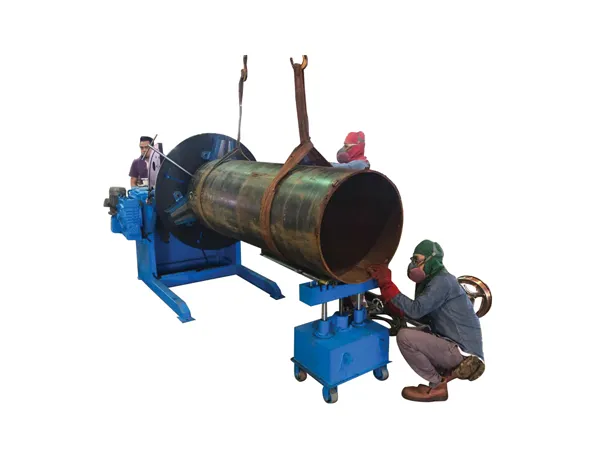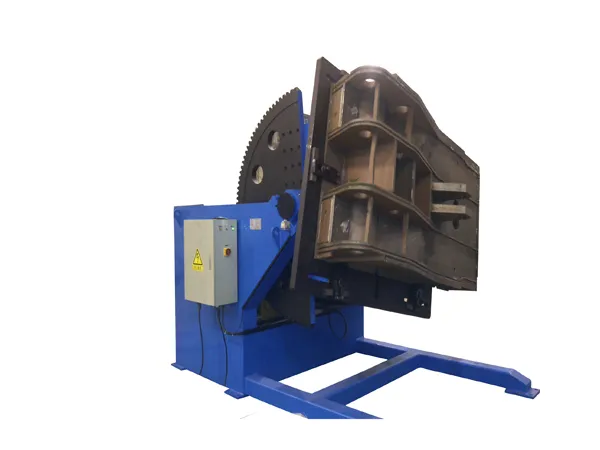In the highly competitive shipbuilding industry, every day counts. Modern shipyards are under constant pressure to deliver high-quality vessels on time, manage costs efficiently, and ensure the safety of their workforce. Traditional manual welding processes struggle to meet these demands, particularly when handling large ship components such as hull plates, deck sections, and bulkheads.
Enter the high-capacity welding positioner — a game-changing piece of equipment that enables shipbuilders to handle large components safely, rotate and tilt them precisely, and achieve consistent, high-quality welds. In this comprehensive guide, we will explore how high-capacity welding positioners revolutionize shipyard operations, improve productivity, and maximize return on investment.

Shipbuilding is a complex process that involves welding large, heavy, and often awkwardly shaped components. Manual handling of these parts not only slows production but also increases the risk of errors and workplace injuries.
High-capacity welding positioners are designed specifically for heavy-duty industrial applications, allowing large ship components to be positioned with precision. By automating rotation and tilt, these positioners enable welders to access every angle effortlessly, reducing fatigue and increasing weld accuracy.
Key applications in shipbuilding include:
Hull plate assembly
Deck section welding
Bulkhead and compartment welding
Large pipe or structural component assembly
This versatility makes them essential equipment for modern shipyards seeking to combine efficiency, safety, and quality.
High-capacity welding positioners consist of a rotating table, tilting mechanism, and precision control system. They can be operated manually or integrated with automated welding robots for seamless operation.
Working principles include:
Automated rotation: Allows components to rotate 360° for full welding access.
Tilting adjustment: Tilts heavy components to optimal welding angles.
Precision control: Ensures consistent positioning, which is critical for uniform weld quality.
Load capacity: Designed to handle extremely heavy parts, sometimes several tons, without compromising stability.
By combining these capabilities, welding positioners eliminate the inefficiencies of manual handling while improving weld accuracy and speed.
3.1. Enhanced Productivity
Automation and precise positioning allow shipyards to complete complex welding tasks faster. When dealing with large ship components, the ability to rotate and tilt parts efficiently can reduce production cycles by up to 30%.
3.2. Improved Safety
Manual lifting of heavy hull plates or deck sections is dangerous. High-capacity welding positioners minimize physical handling, reducing the risk of injuries and ergonomic strain. This safety improvement is critical in modern shipyards where regulatory compliance is a top priority.
3.3. Consistent and Superior Weld Quality
Uniform positioning ensures accurate and defect-free welds, reducing the need for costly rework. For ship hulls and deck sections, weld integrity is paramount, and high-capacity positioners provide the precision required for structurally sound vessels.
3.4. Versatility for Large Ship Components
From massive hull plates to complex deck sections, high-capacity welding positioners can accommodate a wide range of component sizes and weights, making them suitable for diverse shipbuilding tasks.
3.5. Seamless Integration with Automated Shipyard Systems
Modern shipyards increasingly use robotic welding systems and automated assembly lines. High-capacity welding positioners can integrate with these systems to further enhance efficiency, reduce labor costs, and maintain precise weld quality.
Investing in high-capacity welding positioners is not just about acquiring equipment; it is about maximizing operational efficiency and long-term ROI.
Benefits include:
Reduced production time for large ship assemblies
Lower labor costs due to minimized manual handling
Fewer weld defects and rework, saving material costs
Enhanced worker safety and regulatory compliance
Scalable solution for expanding shipyard operations
For shipyards aiming to meet deadlines without compromising quality, high-capacity welding positioners are a strategic investment with measurable returns.

Many leading shipyards worldwide have adopted high-capacity welding positioners to streamline production and improve output quality. Typical applications include:
Rotating and tilting hull plates for assembly lines
Welding large deck sections with robotic welding integration
Positioning bulkheads accurately for modular shipbuilding
These examples demonstrate how high-capacity welding positioners enhance efficiency, precision, and safety, making them indispensable for modern shipbuilding.
High-capacity welding positioners are transformative tools for shipbuilding, offering a combination of efficiency, precision, and safety that traditional manual welding cannot match.
Whether your shipyard is upgrading existing welding systems, integrating automation, or expanding production capacity, investing in high-capacity welding positioners ensures:
Faster, more efficient shipbuilding workflows
Improved worker safety and ergonomics
Consistent, high-quality welds for structural reliability
Seamless integration with modern shipyard automation
Future-proof your shipyard operations by adopting high-capacity welding positioners — the ultimate solution to meet the demands of modern shipbuilding.
Ready to boost productivity, enhance safety, and achieve flawless welds? Explore our high-capacity welding positioners for shipyards today.
No. 1 Intersection of Chuangye Avenue and Weilai Avenue,
Yiyang County,Luoyang City, Henan Province, China
+86 400-0379-069
Copyright © 2023 An Automated Welding and Cutting Equipment Manufacturer Focusing on Welding Column Boom and Welding Rotator | All Rights Reserved Technical support: ShangXian